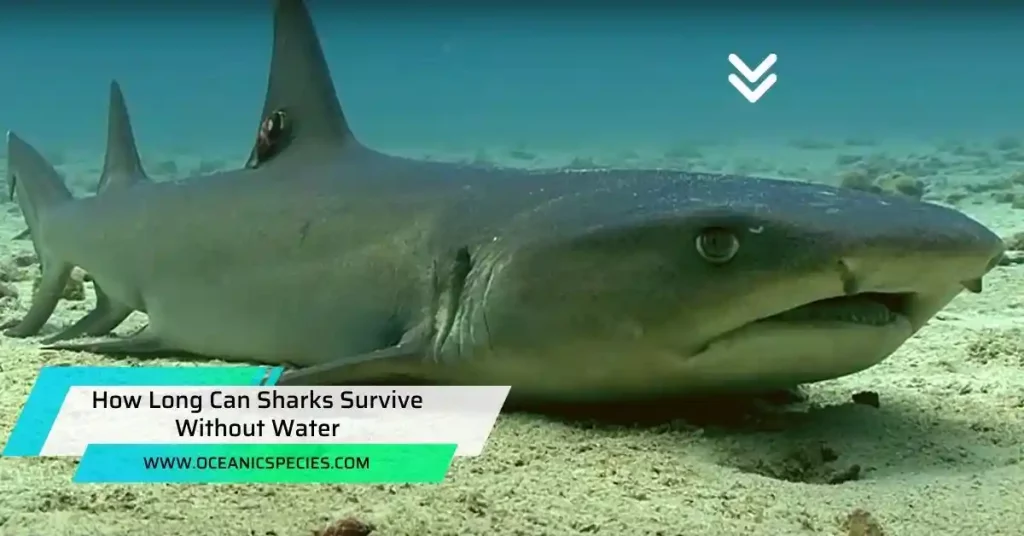Sharks can only survive out of water for a short period of time. They typically cannot survive for more than a few minutes outside of their natural habitat.
Sharks are magnificent creatures that have adapted to survive in the water throughout their existence. However, they are not equipped to survive on land for extended periods. Sharks obtain the oxygen they need to breathe through their gills, which extract oxygen from the water.
Without water, their gills cannot function properly, resulting in a lack of oxygen supply to their organs and tissues. Additionally, sharks rely on the buoyancy provided by water to support their bodies. Without water, their weight can cause stress and injury to their internal organs. While some sharks may survive for a short time if they are kept hydrated and maintain moist skin, it is crucial to return them to their natural environment as quickly as possible for their survival.
Let’s explore more.
How Do Sharks Breathe In Water?

One of the most intriguing aspects of sharks’ anatomy is how they breathe underwater. Unlike humans who rely on lungs to breathe, sharks have a different respiratory system that allows them to extract oxygen directly from the water.
Let’s take a closer look at how sharks breathe in water.
- Gills: Sharks possess gills, which are specialized organs located on the sides of their heads. These gills are responsible for extracting oxygen from the water and expelling carbon dioxide. This process is similar to how human lungs function but is specifically adapted for life underwater.
- Gill slits: Sharks have multiple slits, known as gill slits, on either side of their bodies. These slits are openings that allow water to flow in and out of the gills. As water passes over the gill filaments inside the gills, oxygen is extracted and transferred into the shark’s bloodstream.
- Counter-current exchange: To maximize the efficiency of oxygen extraction, sharks have developed a counter-current exchange system. This means that the water and blood flow in opposite directions, allowing for the maximum amount of oxygen to be absorbed from the water.
- Ram ventilation: Some shark species, especially those that are highly active, employ a technique called ram ventilation. These sharks swim with their mouths open, forcing water into their gills even when they are not actively feeding. This constant flow of water ensures a steady supply of oxygen.
- Spiracles: In addition to gills, some shark species have specialized structures known as spiracles. These are small openings located behind the eyes that serve as an auxiliary respiratory system. When sharks are resting on the ocean bottom or when their mouths are otherwise occupied, spiracles allow them to draw in water for oxygenation.
What Happens To A Shark’S Gills When It Is Out Of Water?
When a shark is out of the water, its gills are unable to extract oxygen from the surrounding environment, leading to suffocation and potential death. This occurs because sharks rely on water passing over their gills to extract oxygen, which is essential for their survival.
Let’s explore this intriguing question.
Gill Functionality Depends On Water

Sharks have specialized gills that are designed to function optimally in water. These gills are composed of a series of thin, feathery structures known as gill filaments. When submerged in water, the gill filaments are constantly bathed in oxygen-rich water, enabling gas exchange to take place.
Gills Collapse And Lose Efficiency
When a shark is taken out of the water, its gills are no longer exposed to the marine environment they are adapted to. As a result, the gill filaments start to collapse, losing their shape and functionality. This collapse is due to the absence of water, which provides support and prevents the gills from collapsing inward.
Gills Cannot Extract Oxygen
Without water, the shark’s gills cannot extract oxygen from the surrounding air, as they are not designed to do so. This means that a shark out of water is unable to breathe using its gills alone. It must rely on alternative methods to obtain oxygen and survive.
Breathing Through Spiracles
Sharks possess an additional respiratory adaptation called spiracles, which are small openings located behind their eyes. These spiracles allow the shark to draw in water even when its mouth is closed. By using the muscles surrounding the spiracles, a shark can force water into its gills, enabling it to continue breathing even when out of water.
Limited Time Out Of Water
Despite the ability to use spiracles for respiration, a shark can only survive for a limited amount of time out of water. The lack of water deprives the shark of the necessary buoyancy to support its body weight. Additionally, the gills lose their efficiency, making it challenging for the shark to extract sufficient oxygen from the surrounding air.
Stress And Increased Energy Consumption
Being out of the water causes immense stress to a shark. The lack of water puts the shark in a state of distress, often leading to exhaustion and increased energy consumption. This can further decrease the shark’s chances of survival if it remains out of water for an extended period.
Return To Water Is Crucial
For a shark’s survival, it is imperative to return it to the water as soon as possible. When back in its natural habitat, the gills regain their functionality and efficiency, allowing the shark to extract oxygen once again from the surrounding water.
The return to water provides relief and a chance for the shark to recover from the stress it endured while out of its element.
Factors Affect How Long A Shark Can Survive Out Of Water
Factors such as size, species, and health condition determine how long a shark can survive out of water. In some cases, smaller and healthier sharks may have a better chance of surviving longer out of water compared to larger or injured sharks.
Let’s explore these factors in more detail.
Size Of The Shark:
The size of the shark plays a significant role in determining how long it can survive out of water. Larger sharks have a higher chance of surviving for a longer period compared to smaller ones. This is because larger sharks have more body mass, which helps retain moisture and oxygen during their time away from the water.
Species Of The Shark:
Different shark species have varying tolerance levels when it comes to surviving out of water. Some species, like the bull shark and nurse shark, have a higher ability to survive in low-oxygen environments. On the other hand, species such as the great white shark might struggle to survive for extended periods outside of water due to their higher oxygen requirements.
Humidity And Temperature:
Humidity and temperature play a vital role in determining how long a shark can survive out of water. High humidity levels help retain moisture in the shark’s skin, reducing the risk of dehydration. Similarly, cooler temperatures can prolong their survival by slowing down their metabolic rate.
However, it’s essential to note that extreme temperatures and low humidity can significantly impact a shark’s ability to survive outside of water.
Time Since Last Meal:
The time since the shark’s last meal is another crucial factor affecting its ability to survive out of water. Sharks have a slow metabolic rate, allowing them to survive for extended periods without food. However, a shark that has recently eaten will have a higher chance of survival due to its stored energy reserves.
Stress Levels:
Stress levels can significantly impact a shark’s ability to survive out of water. When sharks are removed from their natural habitat, they experience high levels of stress, which can lead to physiological changes and increased oxygen demand. Prolonged exposure to stress can exhaust their energy reserves and decrease their chances of survival.
Handling And Treatment:
The way a shark is handled and treated when out of water can also affect its survival rate. Rough handling can lead to physical injuries, causing further stress and reducing its chances of survival. If a shark is mishandled, it may experience internal injuries or damage to its vital organs, further decreasing its ability to survive.
Health And Fitness:
The overall health and fitness of a shark are vital factors affecting its ability to survive out of water. A sick or injured shark will have a lower chance of survival compared to a healthy individual. Sharks with compromised immune systems or pre-existing conditions might not be able to tolerate the stress of being out of water for an extended time.
Environmental Conditions:
The environmental conditions surrounding the shark can also impact its survival outside of water. Exposure to sunlight for extended periods can be detrimental to a shark’s health as it may lead to overheating. Additionally, polluted waters can introduce harmful substances, further jeopardizing its survival.
Predation Risk:
The risk of predation plays a significant role in how long a shark can survive out of water. If a shark is out of its natural element, it becomes more vulnerable to potential predators. The longer a shark is exposed, the higher the chances of predation, reducing its overall survival rate.
Intervention And Rescue Efforts:
In some cases, sharks may be unintentionally stranded or caught in fishing gear, requiring intervention and rescue efforts. Prompt response and appropriate care can significantly increase a shark’s chances of survival when stranded out of water. These efforts often involve safely returning the shark to the water as quickly as possible.
Shark Species That Can Adapt To Living Out Of Water
Some shark species have the ability to adapt to living out of water. These sharks possess the ability to extract oxygen from the air and survive for extended periods in environments with low water or even no water availability.
Let’s dive in and explore these incredible shark species:
Bull Sharks

- Bull sharks possess a remarkable ability to tolerate varying salinity levels, making them the only shark species capable of surviving in both freshwater and saltwater environments.
- These adaptable sharks are often found in rivers and can travel far inland, even thriving in lakes and lagoons.
- Bull sharks have been known to travel hundreds of miles upriver, demonstrating their remarkable adaptability and resilience.
Bamboo Sharks

- Bamboo sharks are small, bottom-dwelling species that have the ability to breathe air using a unique adaptation known as spiracles.
- Spiracles are small openings located just behind their eyes that allow these sharks to draw in oxygen directly from the air, enabling them to survive in low-oxygen environments.
- This adaptation helps bamboo sharks survive in shallow tide pools and even artificial aquariums with stagnant water.
Port Jackson Sharks

- Port Jackson sharks, native to the waters of southern Australia, have the ability to endure prolonged periods of exposure to air.
- They possess muscular gill covers that can seal their gill slits, preventing dehydration during low tide and allowing them to withstand being stranded on rocky shores.
- These sharks are often found in intertidal zones and can survive for several hours out of the water while navigating between rock crevices.
Wobbegong Sharks

- Wobbegong sharks are masters of camouflage and possess the unique ability to remain motionless on the ocean floor, blending in with their surroundings.
- This behavior allows them to ambush prey, but it also helps them survive in low-oxygen environments during low tide.
- By minimizing movement and conserving energy, wobbegong sharks can tolerate extended periods of time out of water.
Frilled Sharks

- Frilled sharks are deep-sea dwellers that inhabit the unexplored depths of our oceans.
- Their remarkable adaptation lies in their ability to slow down their metabolic rate, allowing them to survive in extreme conditions, including being caught in fishing nets.
- This ability to enter a state of torpor enables frilled sharks to conserve energy and endure harsh environments, making them true survivors of the deep.
Frequently Asked Questions
What Happens If A Shark Stays Out Of Water Too Long?
If a shark stays out of water for too long, it will suffocate as its gills need water to extract oxygen.
Can A Shark Survive Being Beached?
No, sharks cannot survive being beached as their ability to breathe and move is drastically impaired.
Do Sharks Die If They Stop Swimming?
Sharks need to keep swimming to stay alive because they rely on water passing over their gills to breathe.
Can Sharks Survive In Freshwater?
Some sharks can survive in freshwater, but most species are adapted to live in saltwater environments.
Conclusion
Sharks are incredibly well-adapted creatures that have managed to survive for millions of years. While they may not be able to live out of water for extended periods of time, they do possess unique mechanisms that allow them to survive in challenging situations.
Their ability to extract oxygen from the water through their gills is crucial for their survival, but they can also slow down their metabolic rate and conserve energy when needed. It’s fascinating to think about how these remarkable creatures have evolved over time to thrive in various environments, including the open ocean and even freshwater systems.
As researchers continue to study sharks, we will gain a deeper understanding of their ability to adapt to changing conditions and the importance of conserving their habitats for the sake of their survival, as well as the health of our planet’s ecosystems.





